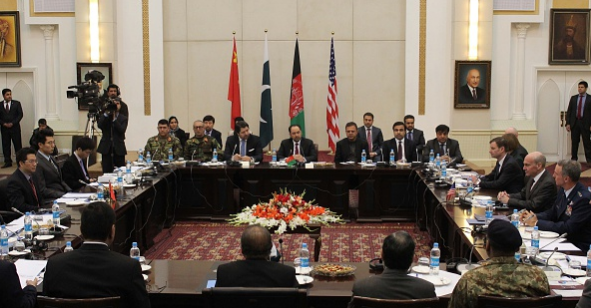
Video: Wilson Center-Is There Any Hope for Peace Talks in Afghanistan? If Not, Then What?
Following Pakistan Foreign Advisor Sartaj Aziz’s surprising moment of candor in which he admitted that Pakistan had “some influence” over the Taliban and could potentially use it to influence them to “come to the table”, there was a belief that Afghan peace talks were finally headed in the right direction. Also, the Quadrilateral Coordination Group on Afghan Peace and Reconciliation (QCG)—made up of the United States, Pakistan, Afghanistan and China—had completed its fourth meeting in Kabul. The buzz was that the next meeting would include the Taliban. Yet, these hopes were quickly dashed when the Taliban reiterated its long-term position to oppose negotiations until foreign troops leave Afghanistan. The mood swiftly shifted from positive to despondent—representative of the fact that the situation on the ground is grim with the Taliban possessing more ground than at any time since their deposition in 2001.
Against this backdrop, the Wilson Center—a prominent Washington DC think tank—assembled a diverse panel of experts, each studying at least one of the QCG members, to discuss the tenuous future of Afghan peace talks. The panel included Vanda Felbab-Brown, Raoof Hasan, Barnett Rubin, and Andrew Small, moderated by Michael Kugelman.
The panelists were in agreement regarding the dispiriting nature of the current Afghan situation, highlighted by Felbab-Brown noting, “I don’t really see good news coming out of Afghanistan.” However, they put forth an array of differing explanations as to why the Afghan peace talks had stalled.
Hasan contended that Pakistan’s duplicitous relations with Afghanistan are a key hindrance to the success of peace talks. He stated: “Pakistan’s interest in a sustainable peace in Afghanistan has to be gauged in the context of the dominant mindset that rules it— a mindset that is consumed with denying the prospect of friendly relations between Afghanistan and India.” Pakistan’s motivations vis-à-vis Afghanistan are indicative of what SAV contributor Sulman Ali identified as the problem of pervasive mistrust between South Asian countries. In regards to the Afghan-Indian relationship, another SAV author Rajeshwari Krishnamurthy recently noted that while India and Afghanistan have been perceived to have moved apart during President Ghani’s tenure, his April 2015 trip to New Delhi indicated that there was still importance in their bilateral relations. For Hasan, Pakistan’s mistrust of any Indian influence in Afghanistan prevents Pakistan from being a good faith contributor to the QCG. Hasan concluded, “It is time given Pakistan’s reservations, given Pakistan’s concerns, it is time for the world community to start thinking in terms of something different. Something where Pakistan possibly does not have as pivotal a role to play as has been granted to it in the QCG.”
Barnett Rubin identified as problematic the lack of consensus between stakeholders in Washington, Kabul, Islamabad, and Beijing on the focus of peace talks. For example, Rubin pointed out, “The Afghan government believes the conflict is between Afghanistan and Pakistan—and that the Taliban are a tool of the Pakistan strategic establishment. That is why President Ghani has said many times that first comes negotiations with Pakistan.” On the other hand, Rubin and SAV contributor Aryaman Bhatnagar both argue that the Taliban only wants to negotiate with the United States and does not see the current Afghan government as legitimate. Looking at the nature of Washington’s Afghanistan planning, SAV Winter 2016 Visiting Fellow Aditi Malhotra attributed the mixed legacy of President Obama in Afghanistan to a lack of strategic clarity. From the Afghan point of view, Felbab-Brown stated, “The negotiations with the Taliban are far more deeply about the negotiation of the (Afghan) elite with itself in a way that has not been taking place.” Overall, there remains little agreement about what exactly needs to be achieved to ensure Afghan peace.
Andrew Small addressed the growing role of China in Afghan peace talks. While the United States, Pakistan, and Afghanistan have been embroiled in the conflict for years, China’s involvement is relatively new. Small attributed this largely to China’s desire for a peaceful regional economic climate and the concern that Uighar militants would find safe haven in an unstable Afghanistan. SAV’s Muhammad Daim Fazil has also identified both these issues, noting: “The more U.S. and Western economic endeavors in Afghanistan shrink, the more China makes inroads. It has pledged $327 million to the Afghan government through 2017.” Additionally, both Small and Daim Fazil noted that much of China’s interest in Afghanistan stems from China’s 46 billion dollar investment in the China-Pakistan Economic Corridor. Small concluded, “Some of the schemes such as the China-Pakistan Economic Corridor are contingent on stability in Afghanistan.”
Ultimately, the panel was symptomatic of recent struggles in Washington and elsewhere to formulate a strategy to quell the Afghan conflict. While the panelists easily identified problems and mitigating factors, there were few suggestions of solutions or recommendations. The conundrum was succinctly summarized by moderator Michael Kugelman in a recent article, “In effect, there are no good options for the United States in Afghanistan — all possible Plan Bs are as problematic as Plan A. And sadly, it is the Afghan people who will suffer the most.”
-Joseph Kendall
*****************
SAV IN DC relates analysis by SAV contributors to Washington DC-based discussions of South Asian strategic affairs.
***
Image: Anadolu Agency, Getty